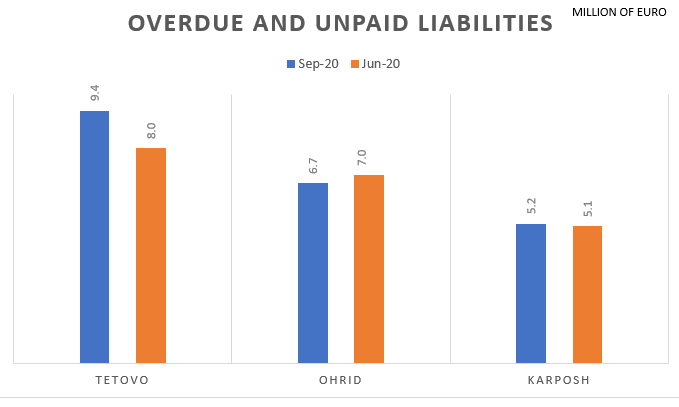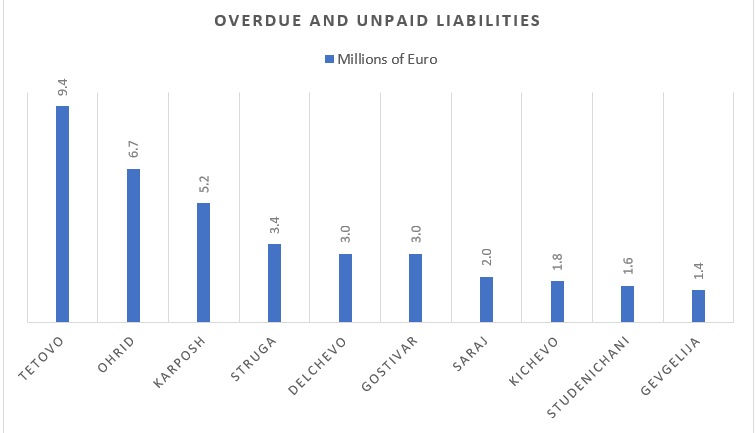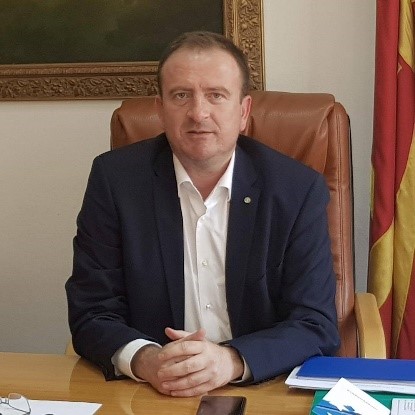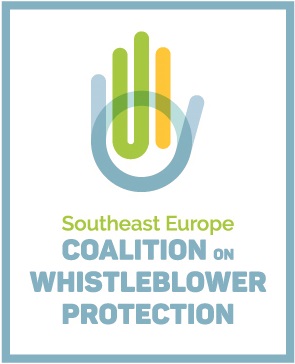


authors: Aneta Dodevska and Ruzica Fotinovska
The debts of the municipalities in the country are growing. As much as 70 out of a total of 80 municipalities in the country reported overdue and unpaid obligations on various grounds. This means that 87.5% of all municipalities in the country face financial problems for regular servicing of the municipalities. In the third quarter of the year, the overdue and unpaid obligations of all municipalities in the country amounted 63,892,100 Euro. According to the analysis in relation to the situation with the second quarter, it shows an increase in unpaid liabilities by 13 million euros. On the latest “debt list” announced by the Ministry of Finance, concluding with the third quarter of 2020, in the first ten, the biggest debtors are three municipalities: Tetovo, Ohrid and Karposh.

Source: Ministry of Finance
In addition to these three municipalities, the first “Top ten Debtors” also includes municipalities with debts higher than 1.5 million Euro.

Source: Ministry of Finance
The mayors we contacted acknowledge that the municipalities are facing large debts that cannot be paid on time.

“Since the beginning of this year, the debt of the municipality of Gostivar has increased from 1 million euro to almost 3 million euro. There are two reasons for this. First, the late reporting of the demand for completed works that occurred before 2018 and newly incurred debts that cannot be settled due to the economic crisis. Specifically, the public enterprise Gostivar reported the collection of taxes for completed works since 2014, 2015 and the years until 2018, and a part of this public company’s liabilities are newly established, or 50% are old, while 50% are newly settled, with total of about 2 million euro. New municipal liabilities are being created and the revenues in the municipality have been reduced, and on the other hand the projects cannot be stopped “- says the mayor of Gostivar municipality, Arben Taravari.
We took a look at the debt structure of one of the most indebted municipalities – the municipality of Ohrid. Due on the basis of court decisions, executive decisions, for the capital sum, for interest …
This is how the debt structure of one of the most indebted municipalities looks like:
| Suppliers – current debt | 65.921.431,00 MKD denars |
| Suppliers-financing projects | 347.500,00 MKD denars |
| Suppliers-Court Judgments | 17.759.742,00 MKD denars |
| Suppliers-Executive court rulings | 105.730.766,00 MKD denars |
| Suppliers – Debt payment agreements | 96.781.384,00 MKD denars |
| Interest on enforcement decisions and court rulings | 187.134.817,00 MKD denars |
| TOTAL | 473.675.640,00 MKD denars |
The first person of the municipality, Konstantin Georgievski, admits that the municipality has been facing a problem for a long time to settle the liabilities, but also that efforts are being made to find a solution.
“With the help of the state through the financial injection that was given to the indebted municipalities in 2019, but due to agreements reached with some of the suppliers to write off interest – the local government has so far reduced its debt by 19.5 million euros. On the basis of interest write-offs alone, the debt has been reduced by almost 4 million euros. The municipality has been facing financial problems for a long time, which we are trying to solve, but there are still demands that increase the debt, “said the mayor of Ohrid, Konstantin Georgievski.
We took a look at a document that was delivered to us by the municipality of Ohrid and which shows that the deterioration of the financial condition of the municipalities is a process that lasts for decades. There has been a lawsuit on the subject of expropriation since the distant year of 1980, for which the municipality now, after four decades, has to pay 415,000 euro.
The Chamber of Enforcement agents does not have an exact tax on how many municipalities are currently blocked by the enforcement agents. However, they say that some municipalities are constantly solvent, and some have blocked accounts for years.
“You ask how the municipalities with blocked accounts function then?” It is possible, due to the legal provision, for the court to determine a threshold-amount of money to the account, above which the money for the trustee can be transferred. That means that all the money up to that amount is free for the municipality to dispose of it, the interest to flow further, and the trustee finds it difficult to fulfill its own solvency,” said the Chamber of Enforcement agents.
They offer a solution for this condition, for which they say that it causes them headaches.
“The situation can be solved, first of all, with the fact that the municipalities will undertake to pay only as much as they can pay. We do not know what is the point of financing the municipalities to the loss of suppliers or any other trustees on any basis. And secondly, to dismiss provision of the Law on Enforcement which protects the municipality and, in fact, with the existence of such a provision the indebtedness of the municipalities is stimulated”.
Some of the municipal fathers managed to “escape” the enforcement agents. Thus, the municipality of Kumanovo managed to release from debt more than 7 million euros for a period of three years.
“After eight years under blockade, the municipality is now unblocked. In three years, we have returned more than seven million euro and at the moment the enforcement agents have no cases on us for forced collection,” said the mayor of Kumanovo, Maxim Dimitrievski.
The large debts of the municipalities forced the central government to react with hundreds of millions of euros – state money to cover the municipal debts. At the end of 2018, according to Article 5 of the Law on Financial Support of Local Self-Government Units for financing overdue and indebted municipalities, financial resources in the amount of 51% of the amount of reported liabilities, are distributed to those municipalities. Although the “holes” were partially sanctioned, some of the municipalities continued to accumulate new obligations.
Audit Scan: Absence of Financial Accountability
Despite the millions of debts that will fall on the “back” of the citizens again in the future, the question arises whether the municipal authorities spent the municipal budget accountably and responsibly. In recent years, auditors have entered a number of municipalities and located numerous violations of the law, and even identified municipalities that spent and conducted public procurement, even though they were legally forced to declare “bankruptcy”. Such is the case with the municipality of Struga.
“Continuously, for more than six months, since 2010 the account of the municipality of Struga is under blockade. “Despite this situation, the mayors who managed the municipality have not made a decision to declare financial instability,” reads one of the latest audit reports regarding the operation of this municipality.
Nevertheless, the mayor of the municipality of Struga, Ramiz Merko, in 2018, when the municipality had a debt of 4 million euros, bought four vehicles worth 114,000 euros, one of which is a luxury “Audi 6” of 66 thousand euros, which is most expensive car bought with public money in the last three years. In 2019, the Anti-Corruption Commission launched a criminal responsibility initiative, not only for the vehicles, but also for all the remarks found by the auditors. The Public Prosecutor’s Office for Organized Crime has opened a preliminary investigation, but there is still no closure.
The audit expressed an unfavorable opinion on the reality and objectivity of the financial statements for 2018 and compliance issuesof activities, financial transactions and relevant information legislation. The financial statements of the Municipality of Struga for 2009 were audited year and a report was issued in which an unfavorable opinion on the reality was expressed and the objectivity of the financial statements, and the consistency of the activities,financial transactions and information with relevant legislation.
| Excerpt from the audit report for the Municipality of Struga (2019) – Basic Budget Account |
With the inspection of the audit reports for the last three years, the analysis shows that under the “magnifying glass” of the auditors were a total of 11 municipalities, namely: Gjorce Petrov, Negotino, Veles, Caska, Aracinovo, Makedonski Brod, Bogovinje, Kisela Voda, Stip, Sveti Nikole, Ohrid. Weaknesses and ambiguities have been identified for the most part, which indicate non-transparency in the area of financial accountability and openness to the public.
“Transparency in the process and preparation and adoption of the Budget is not ensured,”
reads the audit report for the municipality of Bogovinje.
“Precise criteria are not provided for the distribution of funds from the sports program. The funds spent for the realization of the project Pastrmajlijada “refer to the financing of projects that have no cultural values” – note the auditors for Stip.
The first audits of the local self-government units were made in 2001, and were published in 2002 – say from the State Audit Office. We inspected the audits made in the municipalities on an annual basis over a period of one decade. From 2010 to 2020, a total of 82 audit reports were prepared and published, which focused on the regularity and success of the work of the municipalities. In some of the municipalities, several audits were performed. One of the questions we asked the State Auditor refers to how well the municipalities acted on the auditors’ recommendations and remarks.
“We have only aggregate data for acting upon the recommendations of the audited entities and we publish that in the annual reports of the State Audit Office by years, i.e. we do not have special statistics regarding municipalities. In this regard, we would like to inform you that in accordance with the amendments to the Annual Work Program of the SAO in 2020, we plan to conduct an Audit of monitoring the recommendations of 53 local self-government units on the topic “Efficiency of policies, measures and activities in awarding of water law” and to conduct a Performance Audit in 13 units of local self-government on the topic “Efficient treatment and management of plastic waste”. – said the State Audit Office.
From the beginning of the work of the auditors until now – audit control has been done in sixty municipalities, i.e. local governments. Specifically, so far 64 municipalities have been audited. In some of them the auditors inspect twice, such as Tetovo and Stip. The first audits were made in 2002 when the auditors published findings on the operations of Zletovo, Probistip, Kavadarci, Centar, Gazi Baba, Star Dojran, Kratovo, Bogdanci, Karpos, Kisela Voda, Berovo and the City of Skopje.
Source: State Audit Office.
The municipalities, say from this institution, are additionally “controlled” through other thematic audits related to regional development, construction land management, decentralization.
However, non-transparent spending of money at the local level worries both economists and NGOs. They say that a huge part of the municipalities do not have a system and long-term practices, and where the work will start more transparently, the situation changes with each election, a new mayor will come and the work will start again from the beginning.
“Usually, when discussing transparency, the focus is on whether municipalities make their budgets and final accounts public. And that is a minimum and a legal obligation that the municipalities can make “, says Blagica Petreski from the NGO “Finance think” and adds:
“Economists believe that transparency should be analyzed from more essential aspects, how the budget was created, whether all stakeholders participated in that process, whether the selection of projects is based on priorities and the greatest efficiency and effectiveness. “Those aspects, in addition to affecting the responsibility of the Municipalities and accountability to their citizens, will also contribute to better quality budget design.”
This NGO has been working for three years to improve the transparency of the municipalities. But not all mayors accepted the initiative.
“However, for successful implementation of such a process, it is necessary to have openness, readiness and will of the mayors, but also the interest of the citizens to actively attend and contribute to this process. The openness of mayors is still not the same everywhere. This was shown by the fact that we started this process with 12 municipalities, but the organization of public discussions on the budget was accepted by only eight municipalities. On the other hand, in these public discussions, citizens are not always informed and their motive for participating is often skeptical. However, in the municipalities where this is introduced as a regular practice, and this process is repeated, the motivation and participation are greater, “said Petreski.
The Anti-Corruption Commission says that so far, they have not had an open case for non-transparent operation of the municipalities and they have not received such a report from citizens. But they say that from next year they will work preventively as a phenomenon.
“In 2021, we are starting a project with the OSCE. Working groups have already been formed. We will work with the municipalities, there will be trainings on how to increase their transparency. It is not enough just to publish the municipal budget, but also reports on how the money is spent. For example, municipalities have an obligation to fund mass sports, not individual clubs and individuals for whom we never see how the money has been spent. “Those things need to change and we will work on that,” said Biljana Ivanovska, chairwoman of the Anti-Corruption Commission.
Citizens’ money – treated as “personal” means
“Municipalities publish only 36% of the information they need to publish” – this is noted in the latest report of the Center for Civil Communications dedicated to the transparency of institutions and local governments.
According to the Center’s Transparency Index, fourteen out of 81 municipalities were rated with the highest “very good” grade.
Veles is considered to be the most open municipality. It is followed by Skopje’s Karpos, Kriva Palanka, Bitola, Demir Hisar. All are scored with over 88% transparency, out of a possible 100%.
However, on the scale of non-transparency, the municipality of Zelenikovo ended the most infamously with only 4.3% transparency. Staro Nagoricane, Petrovec, Centar Zupa, Lipkovo, Plasnica, Cucer Sandevo also received a grade of “very weak”.
Some of these municipalities that are leading in terms of non-transparency are on the list of debtors – with due and unpaid liabilities. Thus, the municipality of Zelenikovo, as of the third quarter of this year, owes 4 thousand euro. Staro Nagoricane has a debt of 176 thousand euro. Centar Zupa 2,700 euros, Lipkovo with a debt of fantastic 650,000 euro. Plasnica has a due and unpaid debt in the amount of 240,000 euro. The municipalities of Petrovec and Cucer Sandevo are not on the list of debtors of the Ministry of Finance.
“Both the municipalities and the ministries, the state institutions in general, are the weakest in publishing information about their financial operations,” said German Filkov from the Center for Civil Communications, who worked on the analysis. “The latest research that assesses the proactive publication of information of importance to the citizens shows that municipalities publish the least information in the field of budget and fiscal transparency. That is, they publish only 36% of this information (out of a possible 100%). Last year, in 2019, this percentage was even lower, at 26%. This includes information on budgets, final accounts, quarterly reports on budget implementation, public procurement notices, notifications on concluded contracts and contracts themselves, etc. Although they have legal obligations, the publication of information on financial operations also speaks about the attitude of the municipality, i.e. its integrity. Specifically, how much the municipality, the mayor, the officials have a sense of their obligation for transparency, accountability and responsibility to the citizens for spending their money. In this case, by not publishing this information, it fails on two levels. “First, the legal obligations for regular publication of this information are not respected and second – on a personal level, there is no demonstration of responsibility for the money spent that citizens and companies pay as taxes and other duties,” explains Filkov.
The huge non-transparency of some municipalities is shown by the fact that, for example, some municipalities do not even have their own website. Such an example is the municipality of Staro Nagoricane. Search engines show a site that is not working when the municipality’s name is typed.
The research findings show that only 43 out of 81 municipalities this year have improved active transparency. Last year there was an improvement of as many as 70.
Accountability for irresponsible work ….
Although numerous omissions, weaknesses, and even illegal actions have been identified so far, the issue of accountability for irresponsible operations remains.
In order to help the municipalities, the Government made legal changes that further “untied the hands” of the municipalities in planning and spending local budgets.
For some municipalities, this solution may mean opening the way to greater investment, but for others – new debts that will then be serviced again by the citizens.
The government claims that it has a strong political will to stimulate the transparency of municipalities, especially since this is one of the most important remarks of the EU.
“In the coming period, attention will be focused on increasing the transparency of municipalities and publishing data from financial operations on their websites, as well as publishing unpaid liabilities to creditors,” assured the Minister of Finance, Fatmir Besimi.
According to the existing regulations, all institutions, as well as the municipalities are obliged to financial transparency. According to the Law on Accounting for Budgets and Budget Users, written by the Ministry of Finance, Article 30, paragraph 14 states that a fine of 500 to 800 euro in MKD denars counter value will be imposed on the responsible persons of budgets and budget users if they do not publish the final accounts on its website within 15 days from the submission of the invoices to the Central Registry. The control and the initiative for punishing the committed offenses is done by an authorized person from the Ministry of Finance, and the offense sanctions are brought by a competent court.
However, the Ministry of Finance says that so far, no municipality has been fined for not publishing data on a website, without further explanation. And there is no concrete answer whether the municipalities will receive a new financial injection to cover the debts. They say that strengthening fiscal decentralization is one of the essential areas listed in the Government’s program for 2020-2024 and that the obligation for greater transparency will be introduced with the new budget law, which is in process.
“According to the existing legal provisions, mechanisms have already been installed to control the spending of funds in the municipalities, for which they are obliged to submit quarterly financial reports to the Ministry of Finance, and are obliged to publish on their websites how they spend the funds. They are also subject to audits by the State Audit Office. The municipalities are also obliged to submit data on the debts of the municipalities and their budget users in accordance with the Law on Reporting and Recording of Liabilities, while the financial inspection in the public sector supervises. Transparency is crucial for monitoring the spending of public finances, including local ones, that is why the Ministry of Finance has published the tool Open Finance where at the current level all expenditures from the municipal budget can be seen, and thus public pressure can contribute to discipline local authorities,” said the Ministry of Finance.
The draft law on budgets, which has been put into procedure, lists in detail all the documents that municipalities will need to publish on their websites. In addition to the budget, financial plans, quarterly reports or annual financial statements will need to be published. The fines are drastically increasing. If the indicated documents are not on the websites, the fines range from 1000 to 10000 euros for the legal entity and from 250 to 500 euros for the responsible person.
For some economists, a key role in increasing the transparency of municipalities is to organize public discussions when drafting the budget.
“Key stakeholders are the mayor, the municipal council, citizens, NGOs and the business sector. The success of this process largely depends on the openness and interest of all parties. A more active role of the citizens is needed because we saw that the citizens are insufficiently informed about the budget and do not fully know all the rights about taking part in the budget preparation process. Even when they get involved, they do not know how to specify their project proposals. “But our analyzes have shown that public discussions are a great opportunity to identify priorities, but also to put pressure on the local government to realize its pre-election promises,” explains Blagica Petreski from “Finance Think”.
The NGO sector also confirms that municipalities have failed to voluntarily publish financial data. And for those who publish them, it is questionable how understandable they are for the citizens.
“It is important the manner and form in which they will be published so that they can be easily understood by every citizen, and by those who are not experts on those issues. An easy, understandable, easy-to-read way of publishing this information will help the citizens to understand how their money is spent, so that they can participate on that basis in making decisions about to what purpose the money will be spent on. And with that, in the end, apart from the fact that the money will be spent more rationally and purposefully for the needs of the citizens, the trust of the citizens in the municipalities and in the institutions of the system in general will grow “, says German Filkov.
While experts point to the urgency of increasing transparency in municipal operations, especially in the area of public money spending, some local governments continue to show an increase in borrowing on various grounds, and the state in early December approved a new financial package – to help COVID-19 crisis. The list includes all municipalities, not excluding those who still “away from the public eye” hide data on how and what they spend citizens’ money.





